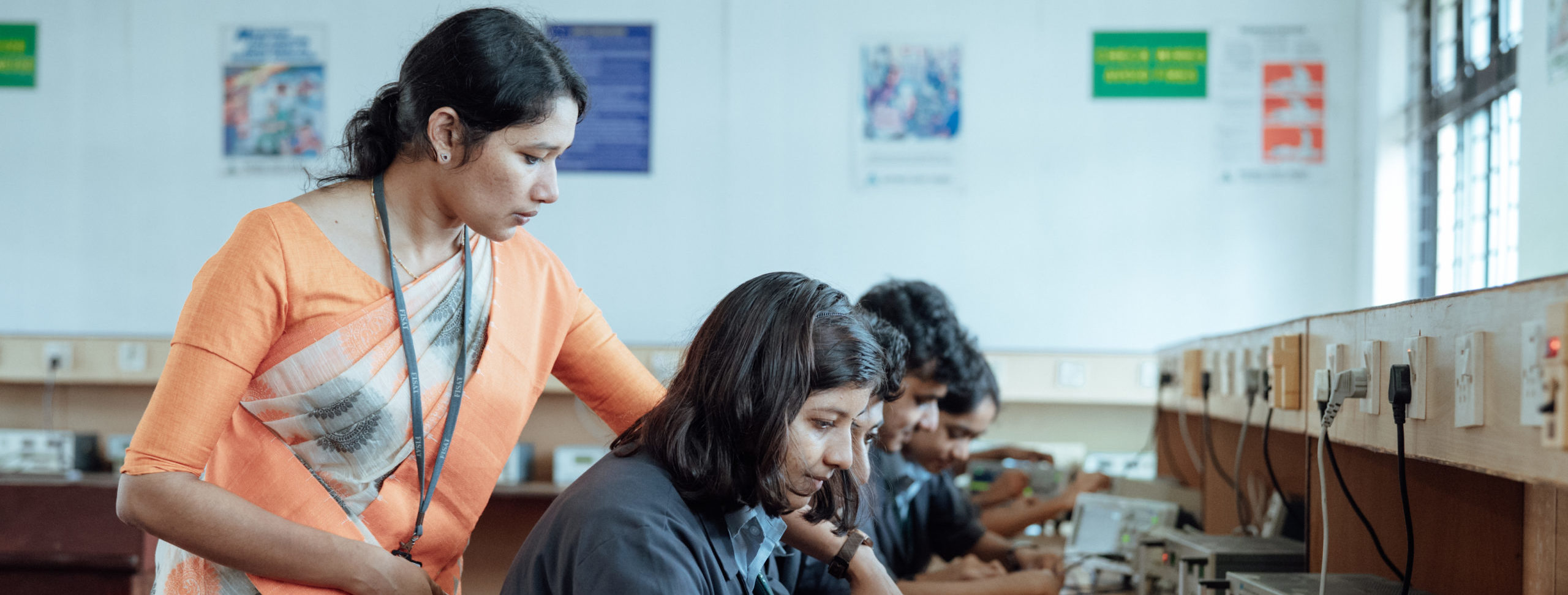
Laboratories
The Department of Electronics and Communication Engineering is well equipped with high-end design and analysis laboratories which are used extensively by the students and faculty members for their curriculum and research activities.
- Basic Electronics Lab (SB313)
Faculty In Charge: Dhanya S
Lab in Charge: Gissy V.A
Students of early semesters will be practicing their lab session in circuit theory at Basic Electronics and Electronic Circuits lab .These lab consists of all types of active/passive components, measuring instruments, Digital Storage oscilloscopes, function generators and various types of decade boxes.
List of Main Equipments:
- Ammeter 0 – 1A, 0-200mA, 0-200μA, 0-100μA
- Function Generator 1MHz and 3MHz
- Dual Output Power Supply 0 – 32V,2A
- Four Output Multi Power Supply 0 – 32V/2A
- Function Pulse Generator 10MHz
- Digital Storage Oscilloscope 50MHz
- Multimeter
- Voltmeter 0 -30V, 0-1V
- Inductance Box
- Electronics Circuits Lab (SB214)
Faculty In Charge: Elza George
Lab in Charge: Shibu Ramakrishnan
List of Main Equipments:
- Function Generator 1Hz-10MHz
- Digital Ammeter 0-20mA, 0-200mA, 0-200 μA
- Ammeter 0-1A, 0-200mA, 0-100μA
- Digital Storage Oscilloscope 50MHz
- LCR Meter
- Power Supply 0-32V
- Voltmeter 0-1V, 0-30V
- Servo Stabiliser 0-230V AC
- Digital IC Trainer kit
- Analog and Digital IC Tester
- Rheostat 0-1KΩ
- Integrated Circuits Lab (SB310)
Faculty In Charge: Pearlsy P.V
Lab in Charge: Benny George
Experiments in the IC lab help the students to get exposure about the analog ICs and Digital ICs performances and applications. It helps the students to design the given specification and requirements and also to check for the functionality by using digital IC trainer kits.
List of Main Equipments:
- Digital IC trainer kit
- Analog and Digital IC Tester
- Multimeter
- Dual Output Power Supply 0-32V
- Function Generator 1MHz and 3MHz
- FPGA trainer kits
- Microprocessor Lab (SB316)
Faculty In Charge:Dr.Anilkumar M.N
Lab in Charge: Laly V .V
Microprocessor lab is equipped with 8051 Microcontroller Trainer kits,6748 Digital Signal Processing Kits HACKRF one SDR TRANSCEIVER, and Simulation softwares such as Ride, Keil, Scilab, Phython,Matlab, Code Compocessor Studio, GNU Radio etc. which creates a practical idea in coding the processor and controller. It helps the students to know the methods of interfacing various peripherals like display, keyboard etc.
List of Main Equipments:
- 8051 Microcontroller trainer kits
- Digital Signal Processing Kit TMS320C6748
- Digital Storage Oscilloscope 50MHZ
- Desktops
- Interfacing cards (display and keyboard, ADC, DAC, Stepper motor)
- HACKRF one SDR TRANSCEIVER
- Communication Lab (SB211)
Faculty In Charge:Nisha R
Lab in Charge: Sheela K George
In the Communication lab the students get practical exposure to microwave theory, analog and digital communication techniques, sampling processes etc. The laboratory is equipped with microwave test benches, Digital Storage Oscilloscopes, different trainer kits in optical fiber communication, satellite communication, various Modulation and Demodulation schemes, etc.
List of Main Equipments:
- Digital Storage Oscilloscope 50 MHz
- Power Supply 32V/2A
- Multimeter
- Inductance Box 100μH – 10H
- Opto Electronic Apparatus
- Antenna Trainer
- Scientific Micro Wave Test Bench MT9000
- Fibre Optic Apparatus
- Function Generator 10 MHz
- Systems Lab (SB209)
Faculty In Charge: Ambili A R
Lab in Charge: Bini T Abraham
The Systems Laboratory helps the students to have an idea in processor programming and also to implement the logic codes. The lab is equipped with different development boards and platforms like Arduino, Raspberrypi, Papilio, etc., special tools like MODELSIM, XILINX, MATLAB, etc enable the students to design, analyze, simulate and even compare results with existing industrial standards.
List of Main Equipments:
- Matlab R2019b(15 user)
- Matlab Communication Block Set (1 User)
- Matlab Communication Tool Box(1 User)
- Matlab Fussy Logic Tool Box(1 User)
- Matlab Signal Processing Tool Box (5 User)
- 20 Desktops
- Project Lab 2 (SB120)
Faculty In Charge: Dr. S Krishna Kumar
Lab in Charge: Bini T Abraham
The PG lab provides softwares needed for design, simulation, and analysis of signal processing systems. Students can design their chips up to 90 nm by using Cadence and alliance tools. Spice simulation software’s provides a platform for circuit analysis and make the student’s job easier.
List of Main Equipments:
8.PG Lab (SB121)
Faculty In Charge: Dr.Anilkumar M.N
Lab in Charge: Bini T Abraham
Signal processing techniques have come to occupy centre place of importance in engineering and technology as evidenced by the plethora of electronic devices available in the market and which employ simple to complex signal processing operations. This points to the opportunities available for signal processing
The centre has facilities such as:
- For simulation purposes, ANSOFT simulation software, Multisim software and PCB design software are also available.
- Additional facilities include ARM microcontroller kits and OMAP boards.
Some of the research activities in progress in the research centre include:
- Transforms of signals for image compression and transmission.
- Digital beam forming for mobile communication.
- Simulation of different types of Microstrip patch antennas.
The centre has also conducted workshops on MATLAB and ANSOFT simulation software and FPGA trainer kits. Workshops on Audrino and RasberryPi were also organised.